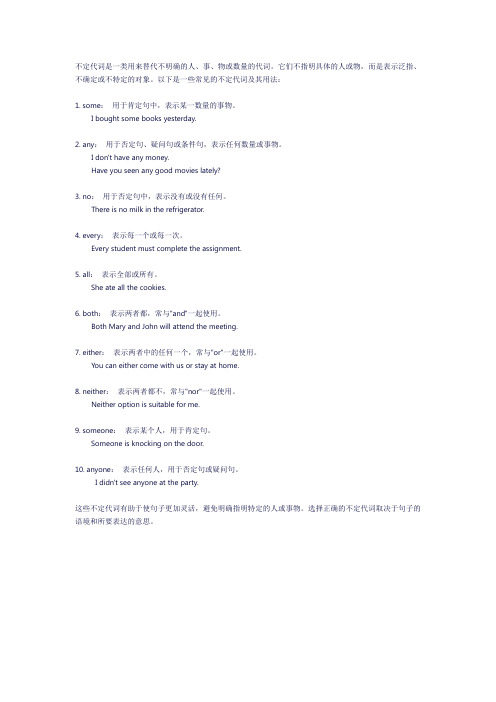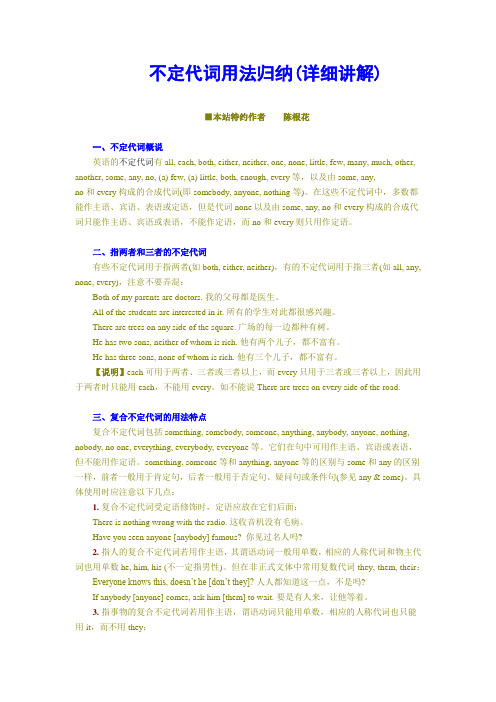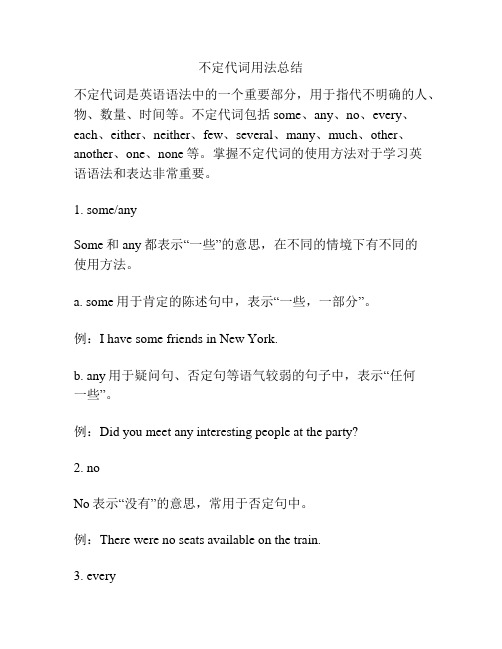不定代词用法总结
不定代词用法总结

不定代词用法总结1)some,any,no的用法a。
some和any通常用于表示不定数或不定量,修饰复数可数名词或不可数名词。
some表示“几个;一些;部分”,多用于肯定句;而any表示“一些;什么;任何;”,对用于否定句或疑问句中.如:*He asked me some questions。
(他问了我几个问题。
)*Some of the bread has been eaten。
(面包已吃了一些。
)*Are there any stamps in this post office? (这个邮局里有邮票吗?)*I didn’t have any cigarettes, so I went out to buy some。
(我没有香烟了,所以出去买了一些。
)b. 刚才我们说some一般用于肯定句而any一般用于否定句和疑问句。
但有时也有例外。
这要根据句子意思来看。
* I could not answer some of his questions. (我不能回答他的某些问题.)(some用在否定句中表示“一些;部分”.如果说成:I could not answer any of his questions.意思就变了,它表示“我不能回答他的任何问题。
”)*Will you get me some apples on your way back?(你回来的路上能给我带一些苹果吗?)(some用在疑问句中大多表示“请求” 或“建议")*Let me know if you hear any news. (如果你有任何消息请告诉我。
) (any用在条件从句中表示“任何")* “What would you like t o drink?” “Any will do.” (“你想喝什么?”“哪种都行。
”) (any在这里表示“任何”)c. no在句子中作定语,表示否定,意思是“没有;不是”,它可以修饰可数名词的单数和复数形式或不可数名词.* There are no letters for you today. (今天没有你的信。
不定代词的用法归纳

不定代词是一类用来替代不明确的人、事、物或数量的代词。
它们不指明具体的人或物,而是表示泛指、不确定或不特定的对象。
以下是一些常见的不定代词及其用法:1. some:用于肯定句中,表示某一数量的事物。
I bought some books yesterday.2. any:用于否定句、疑问句或条件句,表示任何数量或事物。
I don't have any money.Have you seen any good movies lately?3. no:用于否定句中,表示没有或没有任何。
There is no milk in the refrigerator.4. every:表示每一个或每一次。
Every student must complete the assignment.5. all:表示全部或所有。
She ate all the cookies.6. both:表示两者都,常与"and"一起使用。
Both Mary and John will attend the meeting.7. either:表示两者中的任何一个,常与"or"一起使用。
You can either come with us or stay at home.8. neither:表示两者都不,常与"nor"一起使用。
Neither option is suitable for me.9. someone:表示某个人,用于肯定句。
Someone is knocking on the door.10. anyone:表示任何人,用于否定句或疑问句。
I didn't see anyone at the party.这些不定代词有助于使句子更加灵活,避免明确指明特定的人或事物。
选择正确的不定代词取决于句子的语境和所要表达的意思。
不定代词用法总结

不定代词:代替或修饰不特指的人或事物的代词叫不定代词.any用于肯定句时,意思是“任何的”。
Come here with any friend.(随便带什么朋友来吧。
)no和none的用法:no是形容词,只能作定语表示,意思是“没有”,修饰可数名词(单数或复数)或不可数名词.如:There is no time left。
Please hurry up.(没有时间了,请快点)/ They had no reading books to lend.(他们没有阅读用书可以出借)none只能独立使用,在句子中可作主语、宾语和表语,意思是“没有一个人(或事物)”,表示复数或单数。
如:None of them is/are in the classroom。
(他们当中没有一个在教室里)/ I have many books,but none is interesting.(我有很多的书,但没有一本是有趣的)either和neither的用法:either意思是“两个中间的任何一个”;neither是either的否定形式,意思是“两个都不"。
neither和either在句子中可作主语、宾语和定语等,都用作单数。
如:I don't care much for what to drink。
Either of the two will do。
(我不介意喝些什么,两个之中随便哪个都行)/ —-Will yougo there by bus or by car? –Neither. I will go there by train。
(你坐公车去还是坐轿车去?一个都不坐,我坐火车去。
)other、the other和another的用法:other意思是“另一"、“另一些”,有复数形式。
在句子中可作主语、宾语和定语。
another意思是“另外”、“又一个”,表示增加,在句中可作宾语和定语.如:Some girls are singing under the big apple tree and others are sitting on the grass talking。
(完整版)不定代词用法归纳

不定代词用法归纳(详细讲解)■本站特约作者陈根花一、不定代词概说英语的不定代词有 all, each, both, either, neither, one, none, little, few, many, much, other, another, some, any, no, (a) few, (a) little, both, enough, every 等,以及由 some, any,no 和 every 构成的合成代词(即somebody, anyone, nothing 等)。
在这些不定代词中,多数都能作主语、宾语、表语或定语,但是代词 none 以及由 some, any, no 和 every 构成的合成代词只能作主语、宾语或表语,不能作定语,而 no 和 every 则只用作定语。
二、指两者和三者的不定代词有些不定代词用于指两者(如both, either, neither),有的不定代词用于指三者(如all, any, none, every),注意不要弄混:Both of my parents are doctors. 我的父母都是医生。
All of the students are interested in it. 所有的学生对此都很感兴趣。
There are trees on any side of the square. 广场的每一边都种有树。
He has two sons, neither of whom is rich. 他有两个儿子,都不富有。
He has three sons, none of whom is rich. 他有三个儿子,都不富有。
【说明】each 可用于两者、三者或三者以上,而 every 只用于三者或三者以上,因此用于两者时只能用 each,不能用 every。
如不能说 There are trees on every side of the road.三、复合不定代词的用法特点复合不定代词包括 something, somebody, someone, anything, anybody, anyone, nothing, nobody, no one, everything, everybody, everyone 等。
不定代词用法总结

不定代词用法总结不定代词是在句子中代替特定人或物的词语,它们的使用能够让句子更加简洁明了。
下面是对不定代词的用法做一个总结。
1. 一般不定代词一般不定代词包括"something"、"anything"、"nothing"、"everything"等,它们用来代替不具体指向的事物。
例如:- I have something to tell you.- Is there anything I can do for you?- Don't worry, it's nothing serious.- She knows everything about that topic.2. 不定代词"some"和"any""some"和"any"可以用作不定代词,也可以用作不定代词,具体使用要根据句子的语境来确定。
当"some"用作不定代词时,表示肯定或推测的意思。
例如:- There are some books on the table.- Can I have some water, please?当"any"用作不定代词时,表示否定或疑问的意思。
- I don't have any money with me.- Do you have any ideas for the project?3. 不定代词"somebody"、"anybody"、"nobody"和"everybody"这些不定代词用来代替人。
它们的使用方式类似于前面提到的一般不定代词。
例如:- Somebody is waiting for you outside.- Nobody knows the answer.- Can anybody help me with this problem?- Everybody enjoyed the party.4. 不定代词"each"和"every""each"和"every"用来代替三者或多者中的每一个。
不定代词用法总结

不定代词用法总结不定代词是英语语法中的一个重要部分,用于指代不明确的人、物、数量、时间等。
不定代词包括some、any、no、every、each、either、neither、few、several、many、much、other、another、one、none等。
掌握不定代词的使用方法对于学习英语语法和表达非常重要。
1. some/anySome和any都表示“一些”的意思,在不同的情境下有不同的使用方法。
a. some用于肯定的陈述句中,表示“一些,一部分”。
例:I have some friends in New York.b. any用于疑问句、否定句等语气较弱的句子中,表示“任何一些”。
例:Did you meet any interesting people at the party?2. noNo表示“没有”的意思,常用于否定句中。
例:There were no seats available on the train.3. everyEvery表示“每一个”的意思。
例:Every student is required to attend the meeting.4. eachEach表示“每一个”,用于强调个体。
例:Each student is responsible for his or her own progress.5. either/neitherEither表示“两者中的任何一个”,neither表示“两者都不”。
例:You can choose either the blue or the red dress.例:Neither of us likes to cook.6. few/several/many/much这些代词都用于表示数量或程度。
a. few表示“很少,几乎没有”。
例:There were few people in the park on such a hot day.b. several表示“几个,若干”。
不定代词用法归纳
不定代词用法归纳一、不定代词概说英语的不定代词有 all, each, both, either, neither, one, none, little, few, many, much,other, another, some, any, no, (a) few, (a) little, both, enough, every 等,以及由 some, a ny, no 和 every 构成的合成代词(即 somebody, anyone, nothing 等)。
在这些不定代词中,多数都能作主语、宾语、表语或定语,但是代词 none 以及由 some, any, no 和 every 构成的合成代词只能作主语、宾语或表语,不能作定语,而 no 和 every 则只用作定语。
二、指两者和三者的不定代词有些不定代词用于指两者(如 both, either, neither),有的不定代词用于指三者 (如 all, an y, none, every) ,注意不要弄混:Both of my parents are doctors. 我的父母都是医生。
All of the students are interested in it. 所有的学生对此都很感兴趣。
There are trees on any side of the square. 广场的每一边都种有树。
He has two sons, neither of whom is rich. 他有两个儿子,都不富有。
He has three sons, none of whom is rich. 他有三个儿子,都不富有。
【说明】each 可用于两者、三者或三者以上,而 every 只用于三者或三者以上,因此用于两者时只能用 each,不能用 every 。
如不能说 There are trees on every side of the ro ad.三、复合不定代词的用法特点复合不定代词包括 something, somebody, someone, anything, anybody, anyone, nothin g, nobody, no one, everything, everybody, everyone 等。
完整版)不定代词用法总结
完整版)不定代词用法总结不定代词的用法一、不定代词some和any的用法区别一般来说,some用于肯定句中,而any用于否定句和疑问句中。
但是,在表示请求、邀请或征求意见的句子中,通常要用some而不用any,例如:Would you like some cake。
你想吃点蛋糕吗?Why not buy some bread。
为什么不买些面包呢?Shall I get some chalk for you。
要我帮你拿些粉笔来吗?需要说明的是,有时候any也用于肯定句中,此时表示“任何”,例如:Any colour will do。
任何颜色都可以。
Come any day you like。
你随便哪天来都可以。
二、不定代词many和much的用法以及区别不定代词many和much都表示“许多”,但many修饰或代替可数名词(复数),与few(少数)相对;而much用来修饰或代替不可数名词(单数),与little(少量)相对。
在口语中,两者主要用于非肯定句中,例如:Did you see many people there。
你在那儿看见许多人了吗?We don’t have much time。
我们没有许多时间。
XXX work has been done。
许多工作都已经做了。
You’ve given me too much。
你给我太多了。
Take as many (much) as you want。
你要多少拿多少。
I asked her a great many ns。
我问了她许多问题。
另外需要注意的是,too much可以作副词或代词,也可以用作形容词修饰不可数名词,例如:Is watching TV too much good or bad for your health。
看电视太多对你的健康有益还是有害?You’ve given me too much。
你给我的太多了。
We’ve had too much rain lately。
不定代词的用法
不定代词的用法1. some,any(1) some多用于肯定句,修饰复数可数名词和不可数名词,作“一些”解。
它还可修饰单数可数名词,作“某一”解。
如:H-5 avian influenza first broke out in some Asian countries.H-5型禽流感首先在亚洲爆发。
Some people are early risers. 有些人起得很早。
(2) any通常用于否定句、疑问句或条件句,修饰单数或复数可数名词以及不可数名词。
If there are any new magazines in the library, take some for me.图书馆如果来了新杂志,替我借几本。
Are there any stamps in the drawer? 抽屉里有邮票吗?Is there any money with you? 你身上带钱了吗?(3) any还可以用于肯定句,作“任何的”解。
You can come here any time. 你什么时候来都行。
You can get it at any shop. 你可以在任何一家商店买到它。
2. either,both,all(1) either表示“两者中的任何一个”。
Either of the brothers is selfish. 两兄弟都非常自私。
Either will do. 两个都行。
(2) both“两个都”,修饰可数名词,统指两者。
Tom and Jack both made some progress. 汤姆和杰克两个都有所进步。
Both of them should make concessions. 他们双方都应做出让步。
(3) all“全部,所有的”,修饰可数名词和不可数名词,指两个以上的人或物。
All the students contributed to the fund.所有的学生都为基金会捐了款。
不定代词的用法总结
不定代词的用法总结不定代词是指代词中的一类,它们可以用来代替不确定的人、物或概念。
不定代词在英语中有多种形式和用法,下面将总结这些用法,并对其作进一步的解释。
1. 代替不确定的人或物不定代词常被用来代替不确定的人或物。
它们包括somebody/anybody/nobody/everybody,something/anything/nothing/everything以及someone/anyone/no one/everyone等。
例如:- Can anybody help me with this problem? (有人能帮我解决这个问题吗?)- I don't want to buy anything. (我不想买任何东西。
)- Everybody is welcome to join the party. (欢迎每个人参加派对。
)2. 表示某种数量或程度不定代词也可以用来表示一定数量或程度,包括some/few/many/much/little/any/no等。
例如:- She has some money. (她有一些钱。
)- There are few people in the park. (公园里几乎没有人。
)- Do you have any questions? (你有什么问题吗?)3. 表示不完整的内容一些不定代词也可以用来表示不完整的内容,包括some/something/somebody/someone/any/anything/anybody/anyon e/nothing/nobody/no one等。
例如:- I have something to tell you. (我有件事要告诉你。
)- Is there anyone who can help me? (有人可以帮帮我吗?)- She knows nothing about it. (她对此一无所知。
- 1、下载文档前请自行甄别文档内容的完整性,平台不提供额外的编辑、内容补充、找答案等附加服务。
- 2、"仅部分预览"的文档,不可在线预览部分如存在完整性等问题,可反馈申请退款(可完整预览的文档不适用该条件!)。
- 3、如文档侵犯您的权益,请联系客服反馈,我们会尽快为您处理(人工客服工作时间:9:00-18:30)。
不定代词用法总结-标准化文件发布号:(9556-EUATWK-MWUB-WUNN-INNUL-DDQTY-KII不定代词用法总结1) some, any, no的用法a. some和any通常用于表示不定数或不定量,修饰复数可数名词或不可数名词。
some表示“几个;一些;部分”,多用于肯定句;而any表示“一些;什么;任何;”,对用于否定句或疑问句中。
如:* He asked me some questions. (他问了我几个问题。
) * Some of the bread has been eaten. (面包已吃了一些。
) * Are there any stamps in this post office(这个邮局里有邮票吗?)* I didn’t have any cigarettes, so I went out to buy some. (我没有香烟了,所以出去买了一些。
)b. 刚才我们说some一般用于肯定句而any一般用于否定句和疑问句。
但有时也有例外。
这要根据句子意思来看。
* I could not answer some of his questions. (我不能回答他的某些问题。
)(some用在否定句中表示“一些;部分”。
如果说成:I could not answer any of his questions.意思就变了,它表示“我不能回答他的任何问题。
”)* Will you get me some apples on your way back (你回来的路上能给我带一些苹果吗?)(some用在疑问句中大多表示“请求” 或“建议”)* Let me know if you hear any news. (如果你有任何消息请告诉我。
) (any用在条件从句中表示“任何”)* “What would you like to drink”“Any will do.” (“你想喝什么?”“哪种都行。
”) (any在这里表示“任何”)c. no在句子中作定语,表示否定,意思是“没有;不是”,它可以修饰可数名词的单数和复数形式或不可数名词。
* There are no letters for you today. (今天没有你的信。
)* I have no money at the moment. Could you lend me some (我现在没有钱。
你能借我一些吗?)2) 复合不定代词的用法a. 不定代词some, any, no与-one, -body, -thing可以组成九个复合代词。
它们是:someone anyone no onesomebody anybody nobodysomething anything nothing这些复合不定代词只有名词的性质,可以作主语、宾语等。
b. 因为some一般用于肯定句,any一般用于否定句或疑问句,no表示完全否定,因此由some, any, no与-one, -body组成的复合代词的用法也一样。
c. 第二部分为-one和-body的复合代词只用于表示人,它们的形式是单数形式,但有时可以用they或them指代。
* There is someone in your office. Can you hear them talking (你办公室里有人。
你听见他们说话了吗?)d. 第二部分为-thing的复合代词只能用于指物。
如:* There was something wrong with the car so he had to stopped it.* He looked at me and didn’t say anything. * Nothing can be done to save her life.e. 这些复合不定代词如果有其它的形容词修饰,形容词必须后置。
如:* Somebody important has arrived, I’m sure. (important修饰somebody)3) one和none的用法不定代词one指代可数名词的单数,即指人,也指物。
它的复数形式是ones。
在句中可以作主语、宾语、定语等。
* He is not the one who is easily cheated. (one指人) * I’ve made some cakes. Would you like one of them(one指物)* I prefer red roses to white ones. (ones指物) * Are they the ones who moved here a few days ago(ones指人)4) all, every, each, other, another, either, neither, botha. every只有形容词的性质,在句中作定语。
常用于修饰单数的可数名词。
表示“每个;各个”,还可以表示“一切”。
* After the strong wind every flower in the garden was gone.every还可以和-one, -thing, -body构成复合不定代词,即:everyone, everything, everybody。
其中,everyone和everybody用于指人,意思一样,都是“每人;大家”,形式上表示单数意思上可以表示单数也可以表示复数。
everything用于指物,意思是“每件事;一切”,形式上表示单数意思上可以表示单数也可以表示复数。
如:* One can’t have everything. * Everything goes well with me.* The town is so small that everybody knows everybody else.注意:在使用everyone时要注意和every one相区别。
everyone是一个不定代词而every on是一个词组,前者只能指人而后者既可以指人也可以指物。
请注意下列例句:* Everyone will be here except Patrick. (everyone 指人) * Every one of the children will get a gift. (every one也指人) *We played several matches against the visitors, but unluckily lost every one. (every one指物)b. each 的意思是“每个;各自的”,可以指人,也可以指物。
如:* I leave home at 7 a.m. each day. * Each of them has received a letter.由于each 和every 的意思相近,都表示“每一个”,因此要特别注意它们的区别。
each 所描述的对象至少是两个数目中的每一个,而every 所描述的对象至少是三个数目中的每一个;every 着重强调整体的含义而each 着重强调个别;every 只能作形容词放于名词前而each 可以作形容词、代词和副词。
如:*You can see a lot of new shops on each side of the street. (因为街道只有两边因此不能用every)*Each has too coats. (each 是代词不能换用every)c. other 可以指人也可以指物,表示“另外的人或事物”,其后可以接单数或复数的名词;此外,other 也有复数形式,是others 。
如:* He has two brothers, one is a teacher, the other is a doctor.*Some children like milk chocolate, other children prefer plain chocolate.*We should not think only of ourselves, we should think of others first.d. another 的意思是“另一个;再一个;又一个”,通常只能修饰单数的名词或代词,泛指“不定数目中的另一个”。
* Would you like to try another kind of drink * I don't like this hat; please show me another.注意:other 和another 都有“另外的”意思,要注意它们的区别。
首先一般来说,两者中的“另一个”是the other ,不定数目中的“另一个”是another 。
如:* She has a book in one hand and a pen in the other. (这里表示两只手中的另一个因此用the other)* This cup is broken. Get me another, please.其次,other 的后面可以接单数或复数的名词而another 的后面只能接单数名词。
如:* He has other brothers. * I am not very well today. Tell them I will go and see them another day.第三,other 有复数形式,泛指别人时通常不加冠词;而表示其他的人时常要加定冠词;而another 没有复数形式。
* Some went to the People’s Park, others visited the zoo. * Could you tell the others that I’ll be late5) many, much, few, little, a few, a little, a lot of, lots of 这些词都可以用来表示数量,但它们的用法也应当注意。
a. many 和much 这两个词都表示“许多;大量”,它们的比较级和最高级是more 和most 。
它们的不同在于:many 只能指代或修饰可数名词的复数,much 一般只能指代或修饰不可数名词。
如:* “Do you any books on English grammar” “Yes, but not many.” (这里的many 指代上文的books)* Much time will be saved if you plan your work very well. (time 是不可数名词,因此用much)b. (a) few 和 (a) little a few 和a little 是一对用作表示数量的不定代词的固定词组,它们具有名词和形容词的性质,它们的意思是“少数;少量”,都表示肯定的意思。
